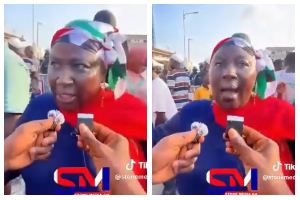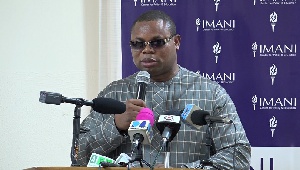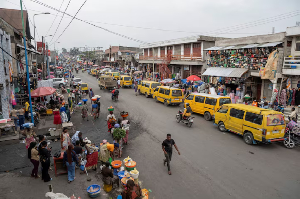Over the past 50 years of Ghana’s independence from British colonialism, it is perhaps fair to say that out of the interesting and diverse array of our heads of state and government, two men have stood out in terms of the depth of their impact across all spheres of our national lives- two men who hold the top two records for longevity in power. I refer, of course, to Dr. Kwame Nkrumah, our first leader (nine years), and Flt-Lt Jerry John Rawlings (rtd), our immediate past president and leader of the PNDC revolution before that (eighteen years in total). One does not have to be a fan of either of the two, nor indeed of their political and economic philosophies in order to appreciate this view. In fact, particularly with Rawlings, many of his political enemies passionately dismiss him as an irrelevance and a negative factor of Ghanaian politics. However, this intense passion underlines my contention that he has made a deep impact on Ghanaian society.
In my view, these men stand out, not necessarily because they were the two longest-serving leaders, even though one cannot deny that this had a bearing on the way they were able to impact society. In many ways, these men share remarkable similarities, and yet they affected the body politic in different ways. Many Nkrumahists will probably regard comparing Rawlings (or indeed any of our post-independence leaders) with the Osagyefo as pretty close to blasphemy. I would argue that this view is not only factually wrong but also intellectually dishonest.
Perhaps the first remarkable factor common to both men is the influence they had on the ordinary voters and they following they derived thence. From the formation of the CPP in Saltpond in June 1949 and his subsequent ‘Positive Action’ initiative, Kwame Nkrumah’s star rose and shone with meteoric speed in the political firmament. His party’s strategy in appealing to the common man-the Verandah Boys and Girls- was a masterstroke, culminating in the CPP winning the 1951 general elections and the Governor inviting him to become Leader of Government Business. This set him and his party on the road to power and miles apart from the UGCC, which was seen as out of touch and crustily elitist, interested only in the needs of the professionals and the merchants. Nkrumah’s powerful and charismatic oratory served him well both at home and abroad, and it was this passion and aura about him that set him above his peers.
JJ Rawlings entered Ghana’s political scene in 1979, at a time when the common man was bearing the brunt of the ‘kalabule’ years of the Acheampong/Akuffo governments that had blighted the nation and almost brought it to its knees. His arrival on the scene galvanised the masses, for he quickly identified them as his core political constituency and set himself as their champion in their quest for justice and accountability. He was dubbed ‘Junior Jesus’, for they genuinely believed he had come to save them from the shackles of economic hardships and lead them into political glory. When he burst again on the scene at the end of 1981, the ordinary workers again surged towards him, and he quickly capitalised on this, drawing in the support of the students to boot. He spoke to them in ‘pidgin English’ a language they understood, and they warmed to him quickly. He cleaned gutters with them and ate with them in public. To date, long after he has left office, a public appearance by Rawlings generates a loyal mass following and guaranteed headlines. His fiery passion and ability to hold his audience captive during public speeches and rallies are characteristics traits of Rawlings.
Both Nkrumah and Rawlings never hesitated to stamp their socio-political and economic beliefs on society, borne out of deep convictions in the way they felt our society should be run. For Nkrumah, socialism (or scientific socialism) with its politically and economically strong centralist state constituted the way forward. He was not interested in dissenting views and moved to ensure that Ghana became a one-party state, deeply convinced that it was the political solution for Africa. He had organs like the Kwame Nkrumah Ideological Institute and a compliant press to freely propagated his views and orientate the people.
Rawlings passionately believed that the revolution he foisted on Ghanaians in 1982 was the only way to achieve a total transformation of Ghanaian society and bring participatory democracy to the people. To this end, he proceeded to establish the PDC/WDC/CDRs, the Public Tribunals and other revolutionary organs to ensure his revolution took root. The Economic Recovery Programme was also launched in a bid to turn the economy around after years of stagnation and mismanagement.
Both men used the powers of state to the full to silence their political opponents’ dissenting voices in their march towards their politico-economic goals. They had a raft of legislations and political tools to achieve this objective, bulldozing through human rights concerns with impunity. Nkrumah had, among others, his Preventive Detention Act (1958), which allowed him to detain people without trial if that was considered to be in the national interest. He also had at his disposal Article 55 of the 1960 Constitution (which allowed him to ignore Parliament and rule by legislative instrument if he considered it to be in the national interest). Rawlings armed himself with the Preventive Custody Law [PNDC Law 4] (which was similar to Nkrumah’s PDA), the Habeas Corpus Amendment Law (PNDC Law 91) and the Newspaper Licensing Law (PNDC Law 211), among others.
With a combination of the ability to drive their beliefs through and the longevity of their rules, both Nkrumah and Rawlings were able to make major transformations of Ghanaian society, and to date, these legacies are with us. Whilst Nkrumah’s political belief systems have long been dismantled, his ambitious development plan for Ghana resulted in physical infrastructure that we see around us today- the secondary schools, the Tema township, the Kwame Nkrumah University of Science and Technology, and a host of others too many to mention here. The lasting monuments have served the nation well and continue to do so.
In Rawlings’ case, there are no physical structures to speak of on Nkrumah’s scale. However, the District Assembly and Junior Secondary concepts are two of the lasting legacies from his rule. Of course, these institutions have many faults (especially the JSS system), but the fact remains that they are now a part of the national fabric, and there is no indication that they will be dismantled anytime soon. His government’s decision to take Ghana through the IMF/World Bank-prescribed Economic recovery Programme (ERP) and Structural Adjustment Programme (SAP), with their attendant severe political challenges was a crucial one. With these programmes came a fundamental shift in the way our society was run, for it meant trade liberalisation, withdrawal of subsidies and state de-regulation, among others. These remain today in one form or the other in our economic structure. Whether the ERP as an economic policy was successful or not was and continues to be a matter of intense debate, but that is an entirely separate argument.
Somewhat ironically, in spite of the above, there are interesting differences between the two men with regard to their political and economic approach. Nkrumah came to power through elections in a multi-party democracy and later sought to entrench himself as Life President as his rule grew more totalitarian and opposition was banned. Rawlings, on the other hand, came to power through the barrel of the gun and established an autocratic system of government that did not tolerate any opposition. However, he later metamorphosed into a democrat and won two presidential elections in a multi-party setting, after which he stepped down as the 1992 constitution stipulated. Thus the two travelled across the political spectrum but in opposite directions.
In my view, Nkrumah’s sharp political antennae, which had been such a great help to him in his ascendancy to power, seemed to have waned in the latter part of his rule as he tightened his grip on the body politic, with tragic consequences in 1966. Rawlings, on the other hand, appeared in national politics a complete novice, yet always stayed one step ahead of the game by being mindful of reality and quickly adapting his colours accordingly, thereby avoiding a social implosion. Thus he was anti-west in the early days of his reign, and yet took us through an World Bank/IMF-sponsored ERP when it became clear that the economy was sick and anti-western rhetoric had its practical limits. Yes, he publicly declared that he hated the ballot box and multiparty elections, but in the face of various factors (both internal and external), he capitulated and presided over the transition to constitutional rule, which resulted in the 4th Republic under which Ghanaians live today.
On the economic front, Nkrumah’s policies, after inheriting a relatively liberal economy, favoured a strong centralist interventionist state on the eastern economic model and moved in that direction whereas Rawlings, after the initial one-year or so of anti-western tirade, set about liberalising the economy and divesting the state-run institutions so beloved of Nkrumah.
I believe of the two men, Kwame Nkrumah generates less passion today against him either way among Ghanaians for two important reasons. The first is the fact that whatever his faults (and they were considerable, I would argue), he was our first post-independence leader and therefore holds a special place in the national consciousness. And I do not believe anyone can doubt the sincerity of his passion for the betterment of the black man, and of the African continent. Beyond Ghana, he is clearly our best-known post independence leader, and it is for good reason that many streets, avenues and buildings are named after him all over Africa. The second reason, I believe, is that Nkrumah has been out of power for almost 40 yeas and has been dead for almost 34 years. Clearly, the passing of time has romanticised him somewhat, especially since not many people in present day Ghana actually lived under his rule. The passage of time has mellowed his faults, especially when you consider his achievements. Few of his political opponents he threw into detention remain alive today.
Rawlings, on the other hand is still alive and very much with us, and for this reason he generates such intense passions today either way on a far larger scale that Nkrumah. He was a thorn in the side of the Limann government and continues to give the NPP government splitting headaches with his public, sometimes inflammatory speeches, which have earned him the nickname ‘Jerry Boom’. The gross human rights abuses that occurred in Ghana during the days of his revolution are still fresh in the mind, and people are not in a hurry to forget that, for there are many living victims of his regime’s excesses and brutalities. On the other hand, those who believed JJ was a godsend defend him staunchly and insist he has been a great leader for our country who came in at the right time to clean the system. Therefore, whenever he opens his mouth and says something controversial, passions erupt on both sides. Therein lies the complex Rawlings factor.
Thus we have our two most significant political leaders, who came onto the scene at different stages of our post-independence development and meant different things to different generations. Of course, they are no longer in the limelight, but from the shadows backstage and from beyond the grave, they continue to rouse our citizens and generate intense debate in a way none of our past leaders has. And it is this very tenet that, in my view, makes them the political giants of our time.















